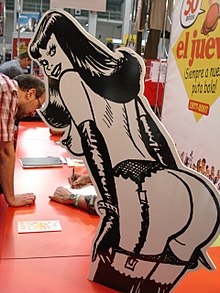Clara de noche ("Clara at night") is a series of comic strips created in 1992 by comic book writers Carlos Trillo, Eduardo Maicas, and the cartoonist Jordi Bernet.[1] It was published weekly in the Spanish magazine El Jueves, starting from number 772. After 1243 consecutive weeks of circulation, the series ended in 2015 in Spain.[2] It had stopped the year before in Argentina (September 2014), where it was simultaneously published in a young persons supplement called No in the newspaper Página/12.[3][4] Over 1,000 episodes of the comic strip[5] were also published in the Italian magazine Skorpio.[6] French, German, Greek[6] and Croatian translations were also made.[7] The series has been compiled periodically into albums,[8] and is considered one of the most important works of the three creators.[9]
| Clara de noche | |
|---|---|
 Life-size figure of Clara de Noche, at the Barcelona International Comic Fair | |
| Publication information | |
| Publisher | El Jueves (Spain) Página/12 (Argentina) |
| Schedule | Weekly |
| Format | Ongoing series |
| Genre | |
| Publication date | 1992 – 2015 |
| No. of issues | 1243 |
| Creative team | |
| Written by | Carlos Trillo Eduardo Maicas |
| Artist(s) | Jordi Bernet |
| Collected editions | |
| Haciendo la calle (2000) | ISBN 84-88403-81-X |
| Todo por la pasta (2005) | ISBN 84-9741569--8 |
| Puta pero honrada (2009) | ISBN 978-84-9741578--1 |
| La historieta de la puta madre (2010) | ISBN 978-84-9741608--5 |
The central character is the prostitute Clara, and the cartoon reflects her amusing adventures and misadventures as a sex worker, along with the peculiar characters that get involved with her and her son Pablito.[10]
Description
editClara de noche was a humorous series of erotic cartoons. Initially it was produced in black and white but later in colour, and covered two pages.[1] It recounts the adventures of an innocent prostitute, called Clara Fernandez, and her relationship with clients.[11] Other characters include her very clever son Pablito and her friend Virtudes.[10]
Clara's physical appearance is clearly inspired by the famous American bondage model and pin-up, Bettie Page.[12]
Controversy
editClara became one of the most popular characters of El Jueves, with a large following of fans who saw in her the idealisation of a woman; a libertine, independent and attractive.Despite this success in both in the Spanish and Argentine press, the comic had been the target of strong criticism and denunciations for alleged sexist and degrading content.[13]
However, in recent years, the comic's has been republished in new editions, maintining the character alive within both the Spanish and Argentinian pop culture.
References
edit- ^ a b "Clara de Noche, vol. 1 (Clara de Noche, #1)". www.goodreads.com. Retrieved 4 March 2019.
- ^ Roach 2017, p. 68.
- ^ "CLARA DE NOCHE | TOP-COMICS". Luis Alberto (in European Spanish). Retrieved 4 March 2019.
- ^ Garcia, Fernando Ariel (29 September 2014). "ADIÓS A CLARA DE NOCHE". LA BITACORA DE MANECO. Retrieved 4 March 2019.
- ^ Roach 2017, p. 42.
- ^ a b "FFF - Fumetto, CHIARA DI NOTTE". www.lfb.it. Retrieved 4 March 2019.
- ^ Markos (24 July 2008). "Klara - Prozor u svijet stripa". www.stripovi.com (in Croatian). Retrieved 4 March 2019.
- ^ Magneron, Philippe. "Clara de noche - BD, informations, cotes". www.bedetheque.com (in French). Retrieved 4 March 2019.
- ^ "Falleció Carlos Trillo, un grande de la historieta argentina". www.clarin.com. 9 May 2011. Archived from the original on 12 May 2011. Retrieved 4 March 2019.
- ^ a b Martínez, Alejandro (7 December 2017). "Clara de Noche, de Bernet, Trillo y Maicas". Es la hora de las tortas!!! (in Spanish). Retrieved 4 March 2019.
- ^ Marinelli, Diego (10 May 2011). "Carlos Trillo: Murió en Londres un grande de la historieta argentina". Clarin. Retrieved 4 March 2019 – via PressReader.
- ^ Trillo, Maicas & Bernet 2017, p. 6.
- ^ Acevedo, Maria Alejandra (December 2010). "Ensayo sobre fábulas de heterodesignación y textos de resistencia en las historietas" (PDF). Carrera de Ciencias de la Comunicación. Retrieved 23 May 2022.
Bibliography
edit- GUIRAL, Antoni (November 2009). Jordi Bernet. 50 años de viñetas (in Spanish). Barcelona: Ediciones El Jueves, S. A. Colección Magnum nº 9. ISBN 978-84-9741-601-6.
- Roach, David (2017). Masters Of Spanish Comic Book Art. Dynamite Entertainment. ISBN 9781524101343.
- Trillo, Carlos; Maicas, Eduardo; Bernet, Jordi (2017). Clara De Noche (in Spanish). Evolution. ISBN 978-84-9167-160-2.